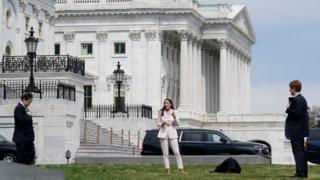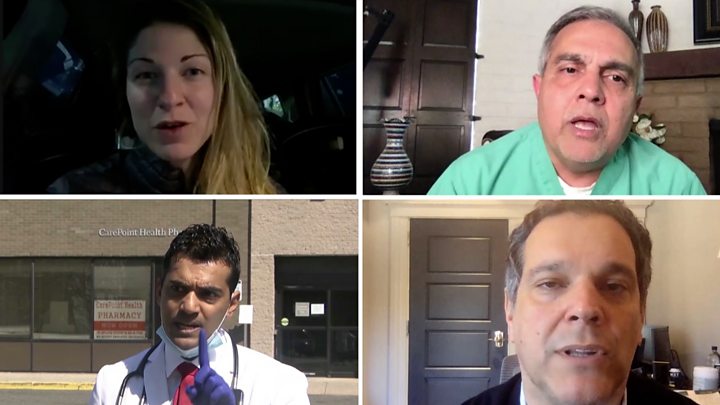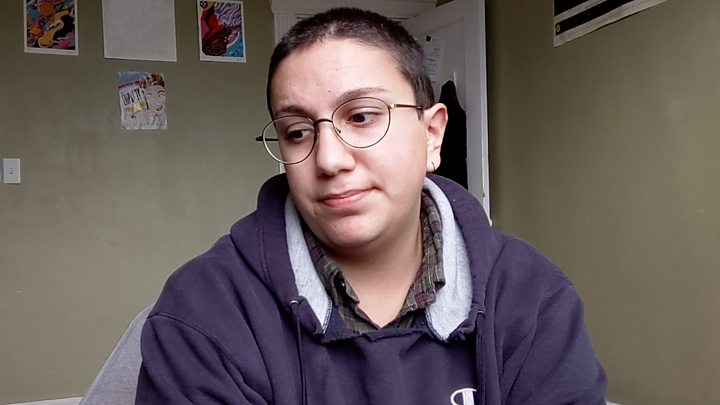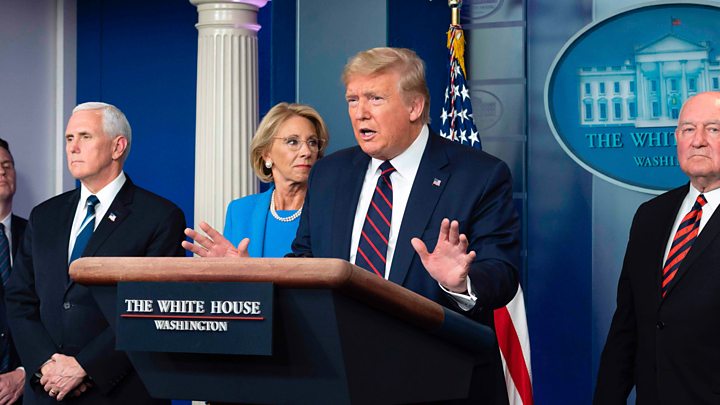This website uses cookies so that we can provide you with the best user experience possible. Cookie information is stored in your browser and performs functions such as recognising you when you return to our website and helping our team to understand which sections of the website you find most interesting and useful.
 Image copyright AFP
Image copyright AFPPresident Trump has signed the largest-ever US financial stimulus package, worth $2tn (£1.7tn), as the country grapples with the coronavirus pandemic.
The House of Representatives passed the cross-party bill two days after the Senate debated its provisions.
On Wednesday the number of Americans filing for unemployment surged to a record high of 3.3 million people.
The US has more confirmed cases of coronavirus than any other country, with more than 100,000 positive tests.
No Democratic lawmakers were invited to the historic signing ceremony, which was held at the White House, though the president thanked both parties "for coming together, setting aside their differences and putting America first".
Mr Trump said the package was "twice as large" as any prior relief bill.
"This will deliver urgently needed relief to our nation's families, workers and businesses," he said.
Just before signing the act into law, Mr Trump invoked the Defence Production Act (DPA), which gives the president the power to force private industries to create items required for national defence.
Mr Trump said the order will compel General Motors (GM) to manufacture much-needed medical ventilators for the federal government.
Earlier in the day, Mr Trump tweeted that GM had promised to "give us 40,000 much needed Ventilators, 'very quickly'.

Media playback is unsupported on your device
"Now they are saying it will only be 6,000, in late April, and they want top dollar," he said, threatening to invoke the DPA.
During the bill signing, the president said that "tremendous [medical] supplies" would be coming soon, adding: "We've had great results on just about everything we're talking about."
Earlier on Friday, New York Governor Andrew Cuomo announced eight temporary hospitals to meet an expected surge in cases.
He said 519 people had died in the state - the worst-hit in the US - and there were 44,635 confirmed cases.
What happened in Congress?
Democrats and Republicans in the Democratic-led House approved the stimulus package by voice vote on Friday following a three-hour debate.
"Our nation faces an economic and health emergency of historic proportions due to the coronavirus pandemic, the worst pandemic in over 100 years," House Speaker Nancy Pelosi said.
Members of the House had been ready to conduct the vote at their homes but were forced to return to Washington at the last minute after a Republican representative from Kentucky demanded a quorum of half the chamber be present.
Thomas Massie - who objected to the stimulus package saying it contained too much spending - also sought to delay proceedings by demanding a formal recorded vote, as opposed to a voice vote, but was overruled.
Mr Trump vented his fury at Mr Massie on Twitter, calling him a "third-rate grandstander" and demanding he be thrown out of the Republican party.
What's in the stimulus package?
The new law enables direct payments to individuals and companies whose livelihoods and businesses have been affected by the pandemic.
It seeks to deliver $1,200 to every American earning less than $75,000 per year and $500 per child.
It also gives money to directly to state governments, and bolsters the unemployment benefits programme.
Under the law, jobless benefits will be extended to those not normally covered, such as freelancers and workers in the gig economy.

Media playback is unsupported on your device
The bill also offers loans and tax breaks to companies that face going out of business, as one in every four Americans is ordered to remain at home and only go outside for essential needs.
Officials across the US have closed restaurants, bars, cinemas, hotels and gyms in an effort to slow the spread of the virus.
Car firms have halted production and air travel has fallen dramatically. According to economists, a fifth of the US workforce is on some form of lockdown.
What else is happening in the US?
With almost 1,500 virus-related fatalities, the US death toll remains lower than those in Italy and China. But there are virus hotspots in New York, New Orleans and Detroit.
Mr Cuomo said in any "realistic scenario" cases of people seriously ill from the virus would overwhelm New York's healthcare system.
Tesla gives New York hundreds of ventilators
He said the state had an "astronomical" shortfall in the number of ventilators - which support patients who are no longer able to breathe on their own.

Media playback is unsupported on your device
Demand for ventilators has also doubled in the southern state of Louisiana. Governor John Bel Edwards said New Orleans would run out of ventilators by 2 April and possibly run out of hospital beds by 7 April if the number of new infections did not subside.
"It's not some flimsy theory. This is what is going to happen," he said.
Medical staff across the country are also reporting shortages of personal protective equipment.
Earlier on Friday World Health Organization chief Dr Tedros Adhanom Ghebreyesus said a "chronic global shortage" of protective equipment was one of the "most urgent threats" to the ability to save lives.
On Thursday Vice-President Mike Pence said coronavirus tests were now available in all 50 states and more than 552,000 tests had been conducted nationwide.
Mr Trump has set a much-criticised goal of Easter Sunday, 12 April, for reopening the country.



 Africana55 Radio
Africana55 Radio 
